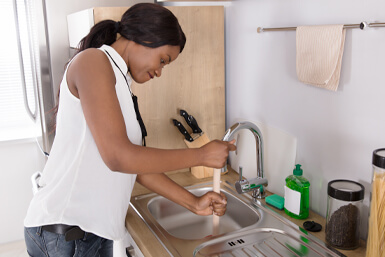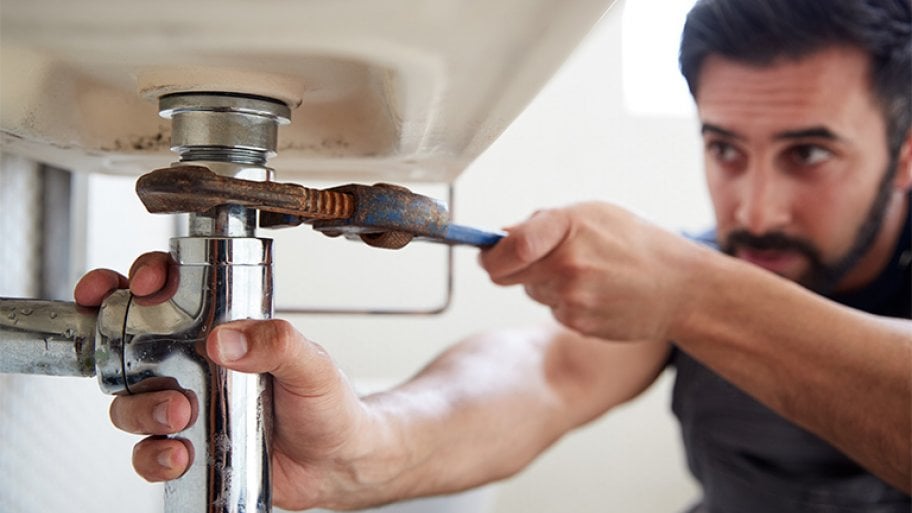We've unearthed the article relating to Why Do My Pipes Make Noises below on the web and decided it made good sense to share it with you in this article.

To diagnose loud plumbing, it is very important to establish very first whether the undesirable sounds happen on the system's inlet side-in various other words, when water is turned on-or on the drain side. Sounds on the inlet side have varied causes: extreme water stress, used valve and also tap components, improperly connected pumps or other home appliances, improperly placed pipeline bolts, and plumbing runs including a lot of tight bends or various other limitations. Noises on the drain side typically stem from inadequate place or, just like some inlet side noise, a design consisting of tight bends.
Hissing
Hissing noise that occurs when a tap is opened slightly generally signals excessive water stress. Consult your neighborhood public utility if you presume this trouble; it will have the ability to inform you the water stress in your area and also can mount a pressurereducing shutoff on the inbound supply of water pipe if needed.
Various Other Inlet Side Noises
Creaking, squeaking, scraping, snapping, and touching usually are triggered by the expansion or contraction of pipelines, generally copper ones supplying warm water. The audios take place as the pipes slide versus loosened bolts or strike nearby residence framing. You can commonly pinpoint the area of the issue if the pipelines are revealed; simply follow the sound when the pipelines are making noise. Probably you will certainly uncover a loose pipe wall mount or a location where pipes exist so near floor joists or various other mounting pieces that they clatter versus them. Connecting foam pipeline insulation around the pipes at the point of contact should remedy the trouble. Make sure straps as well as wall mounts are safe and secure as well as give ample support. Where feasible, pipe bolts should be connected to enormous architectural aspects such as foundation wall surfaces rather than to framing; doing so lessens the transmission of resonances from plumbing to surfaces that can magnify as well as transfer them. If affixing fasteners to framework is inescapable, cover pipes with insulation or various other resistant product where they speak to fasteners, as well as sandwich completions of brand-new fasteners between rubber washers when installing them.
Correcting plumbing runs that suffer from flow-restricting limited or countless bends is a last option that ought to be taken on just after consulting a skilled plumbing contractor. Regrettably, this circumstance is relatively usual in older houses that might not have been developed with interior plumbing or that have seen several remodels, particularly by novices.
Babbling or Screeching
Intense chattering or screeching that occurs when a shutoff or faucet is activated, and that typically disappears when the installation is opened fully, signals loosened or malfunctioning inner components. The solution is to replace the shutoff or tap with a new one.
Pumps and also devices such as washing devices as well as dishwashing machines can transfer motor noise to pipelines if they are poorly linked. Connect such products to plumbing with plastic or rubber hoses-never inflexible pipe-to isolate them.
Drainpipe Noise
On the drain side of plumbing, the chief objectives are to eliminate surfaces that can be struck by dropping or hurrying water and to insulate pipelines to contain unavoidable noises.
In brand-new building and construction, bath tubs, shower stalls, toilets, as well as wallmounted sinks as well as basins ought to be set on or versus durable underlayments to minimize the transmission of sound with them. Water-saving bathrooms and also taps are less noisy than conventional versions; install them as opposed to older types even if codes in your location still permit utilizing older components.
Drains that do not run up and down to the cellar or that branch right into straight pipeline runs sustained at flooring joists or other framing existing specifically troublesome noise issues. Such pipelines are large sufficient to emit substantial resonance; they additionally carry substantial quantities of water, that makes the circumstance worse. In new building and construction, define cast-iron soil pipelines (the huge pipes that drain pipes toilets) if you can manage them. Their massiveness contains much of the noise made by water travelling through them. Also, avoid routing drains in wall surfaces shown rooms and also areas where people gather. Walls having drainpipes ought to be soundproofed as was explained previously, making use of double panels of sound-insulating fiber board and wallboard. Pipes themselves can be covered with special fiberglass insulation created the purpose; such pipelines have a resistant vinyl skin (sometimes having lead). Outcomes are not always sufficient.
Thudding
Thudding noise, typically accompanied by shuddering pipelines, when a faucet or home appliance shutoff is shut off is a problem called water hammer. The noise and also resonance are caused by the resounding wave of stress in the water, which unexpectedly has no place to go. Occasionally opening a shutoff that releases water promptly into an area of piping having a restriction, joint, or tee fitting can produce the exact same problem.
Water hammer can usually be cured by installing installations called air chambers or shock absorbers in the plumbing to which the trouble shutoffs or faucets are linked. These gadgets allow the shock wave developed by the halted flow of water to dissipate in the air they include, which (unlike water) is compressible.
Older plumbing systems may have brief upright areas of capped pipe behind wall surfaces on tap runs for the very same objective; these can eventually full of water, minimizing or ruining their performance. The treatment is to drain pipes the water system totally by shutting off the primary water supply valve and also opening all taps. Then open the major supply valve as well as shut the faucets one at a time, beginning with the tap nearest the valve and finishing with the one farthest away.
3 Most Common Reasons for Noisy Water Pipes
Water hammer
When water is running and is then suddenly turned off, the rushing liquid has no place to go and slams against the shut-off valve. The loud, thudding sound that follows is known as a water hammer. Besides being alarming, water hammer can potentially damage joints and connections in the water pipe itself. There are two primary methods of addressing this issue.
Check your air chamber. An air chamber is essentially a vertical pipe located near your faucet, often in the wall cavity that holds the plumbing connected to your sink or tub. The chamber is filled with air that compresses and absorbs the shock of the fast moving water when it suddenly stops. Unfortunately, over time air chambers tend to fill with water and lose their effectiveness. To replenish the air chambers in your house you can do the following. Turn off the water supply to your house at the main supply (or street level). Open your faucets to drain all of the water from your plumbing system. Turn the water back on. The incoming water will flush the air out of the pipes but not out of the vertical air chamber, where the air supply has been restored. Copper pipes
Copper pipes tend to expand as hot water passes through and transfers some of its heat to them. (Copper is both malleable and ductile.) In tight quarters, copper hot-water lines can expand and then noisily rub against your home's hidden structural features — studs, joists, support brackets, etc. — as it contracts.
One possible solution to this problem is to slightly lower the temperature setting on your hot water heater. In all but the most extreme cases, expanding and contracting copper pipes will not spring a leak. Unless you’re remodeling, there's no reason to remove sheetrock and insert foam padding around your copper pipes.
Water pressure that’s too high
If your water pressure is too high, it can also cause noisy water pipes. Worse, high water pressure can damage water-supplied appliances, such as your washing machine and dishwasher.
Most modern homes are equipped with a pressure regulator that's mounted where the water supply enters the house. If your home lacks a regulator, consider having one professionally installed. Finally, remember that most plumbers recommend that water is delivered throughout your home at no lower than 40 and no greater than 80 psi (pounds per square inch).
Whatever the state of your plumbing, one thing is certain — you’re eventually going to encounter repair and replacement issues around your home that require professional help. That’s where American Home Shield can come to your aid.
https://www.ahs.com/home-matters/repair-maintenance/causes-of-noisy-water-pipes/

We had been shown that report about Why Your Water Pipes Are Noisy and How To Shut Them Up through someone on our other website. Sharing is nice. You just don't know, you may be helping someone out. Thank-you for going through it.
Estimate Free